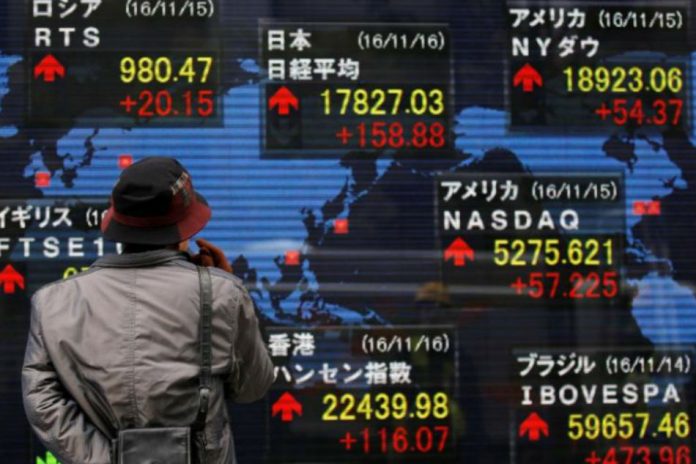The Asian markets were mixed in morning trade on Friday after the latest US coronavirus stimulus measures boosted Wall Street overnight.
In its latest attempt to ease the economic pain inflicted by the COVID-19 pandemic, the US Federal Reserve said it would pump $2.3 trillion through new lending programmes.
The pandemic has now claimed more than 94,000 lives around the world and hammered economies, sending governments and central banks scrambling to put together unprecedented, massive emergency measures. The strong close on Wall Street helped Tokyo’s benchmark Nikkei 225 index open higher, but it soon lost those gains and was 0.1 percent lower. Shanghai also edged down 0.1 percent, but Seoul was up 0.2 percent and Taipei rose 0.2 percent. Hong Kong, Sydney, Wellington, and Singapore were closed for a public holiday.
The Fed appears to be “on a mission to blow holes in every dam that stops the flow of credit”, said Stephen Innes, chief global markets strategist at AxiCorp. “And it sure sounds like they have plenty more dynamite if needed.” The European Union also followed the US with its own rescue package worth 500 billion euros ($550 billion) to ease the impact of COVID-19 in the 27-nation bloc. Millions of jobs have been lost during the pandemic, with data released Thursday showing 17 million people have lost their jobs in the United States alone since mid-March.
But investors appear to be focused more on the impact of the stimulus packages and if they will be able to achieve the stability governments are hoping for.
Worst ‘since Great Depression’
The latest emergency measures came as the International Monetary Fund warned that 170 of its 180 members would see declines in per capita income this year. “We anticipate the worst economic fallout since the Great Depression,” said IMF chief Kristalina Georgieva, urging governments to provide lifelines to businesses and households alike, and cautioned that “it could get worse”.
Major oil producers, meanwhile, continued to try and hammer out a final deal to cut output and stabilise crude prices, which have plunged because of the pandemic and a bruising price war between Saudi Arabia and Russia. Prices have been hovering at near-two-decade lows because of falling demand and a supply glut as lockdowns and movement restrictions bring economic activity to a halt in most countries.
US President Donald Trump said the producers — including Moscow and Riyadh — were close to a deal, but Bloomberg News reported that the tentative deal was threatened when Mexico pulled out.
Brent Crude was down 4.1 percent, and West Texas Intermediate was 9.3 percent lower.




